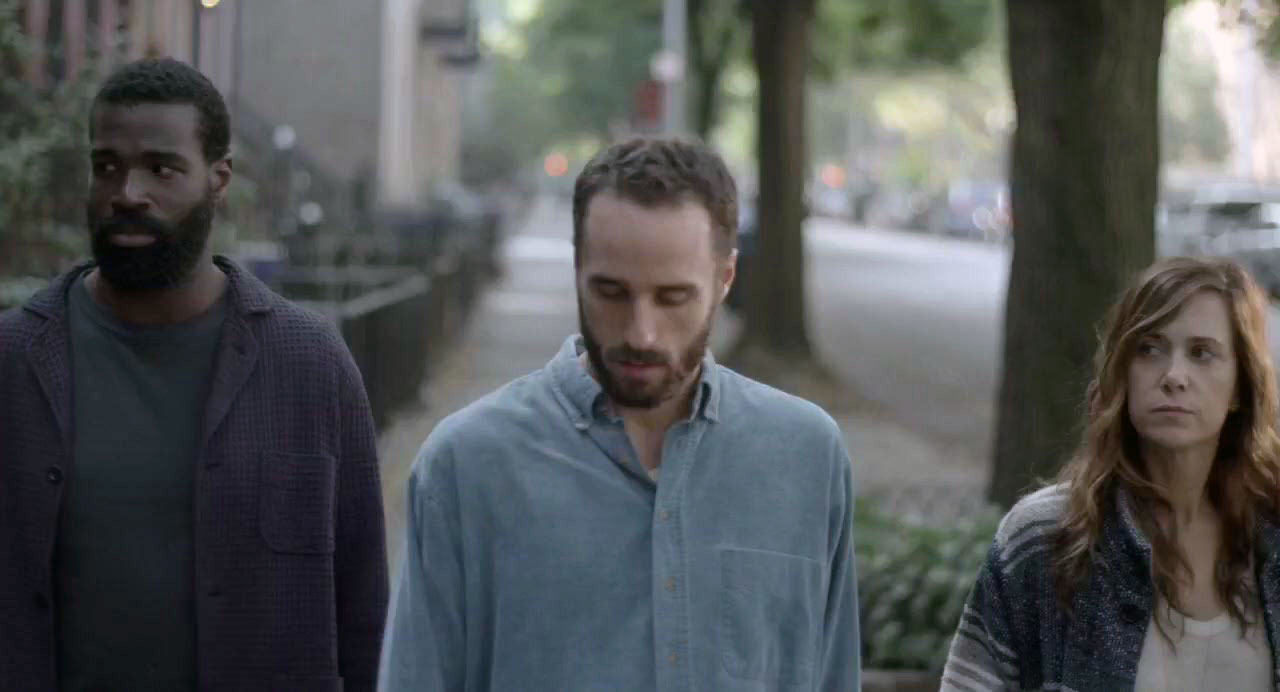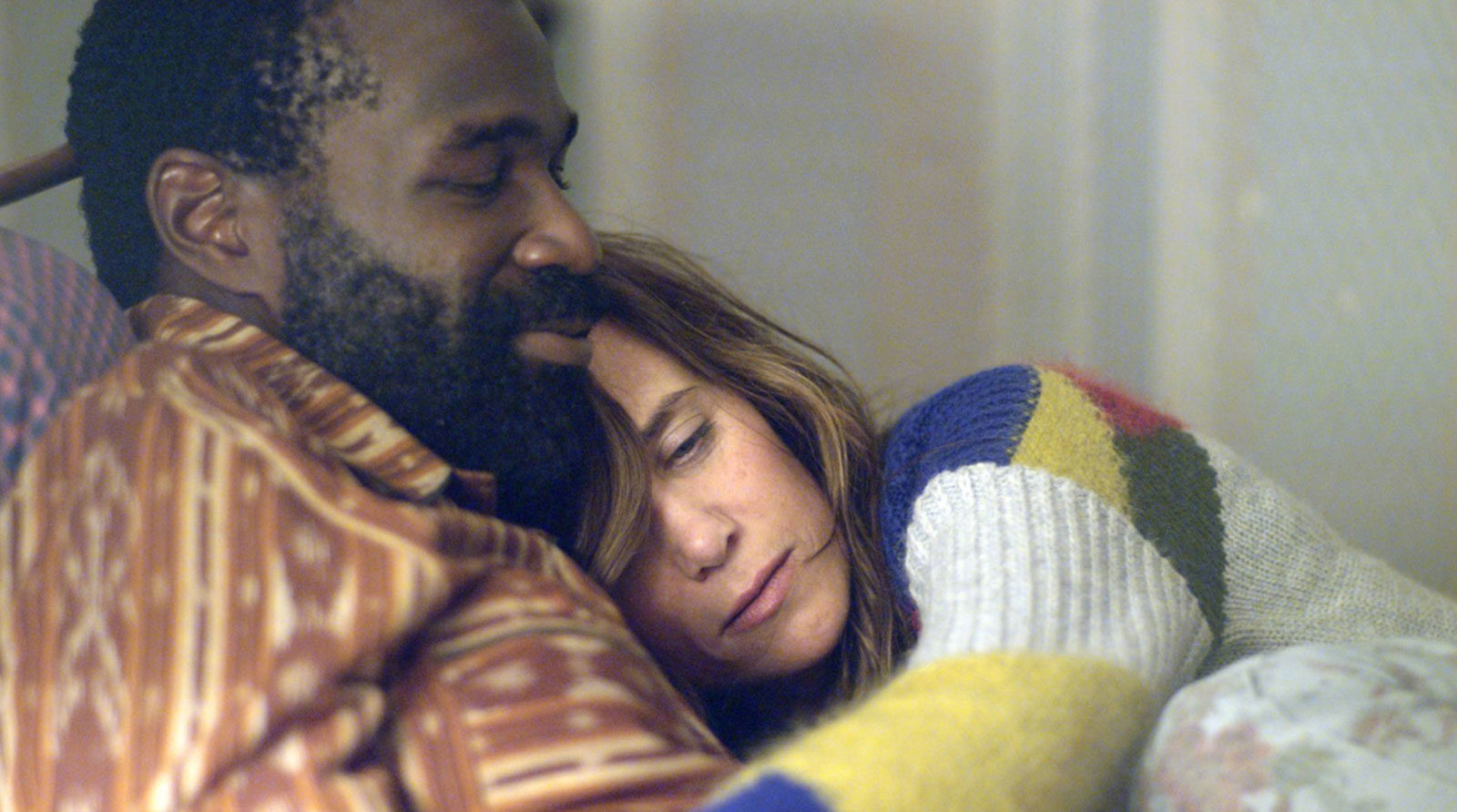Roughly halfway through the young Chilean director Sebastián Silva’s excellent film, Nasty Baby (2015), there’s a revealing, complicated, delicately handled scene in which a black local beat cop (Catrina Ganey) intervenes in a neighborhood dispute in an upscale part of Brooklyn. Entirely convincing and plausible, it is the polar opposite of the stomach-churning videos we have been watching on the news: police pumping bullets into young black men, cops felled by a sniper. Without preaching or making obvious points, this scene (like the rest of the film) reminds us: how many of our daily interactions are shaped by race and class, how well we understand or intuit this fact, and how much about these issues remains unspoken. The brief interaction—of a conflict humanely and reasonably resolved—offers something like hope, which the last part of the film will proceed to cast in shadow.
The neighborhood is Fort Greene, where rapid gentrification has greatly transformed the neat blocks of trees and handsome brownstones, some of which have been divided into sunny apartments where designer cats loll among the thriving houseplants, and where the dinner tables are large enough to accommodate large gatherings of young, attractive, racially (if not economically) diverse friends. The same relaxed, privileged demographic populates the coffee shops springing up everywhere, where biracial, heteronormative, and LGBT families park their baby strollers and have what appear to be close affectionate conversations. An urban paradise.
Among its blessed residents are Freddy, an artist and immigrant from South America (played by Silva) and his lover Mo (Tunde Adebimpe), a handsome, decent, intelligent man who works in some sort of upscale carpentry shop. Newly obsessed with babies, with images of himself as a baby, and with a planned performance piece in which he will lie on the floor and wriggle and squawk like an angry infant, Freddy wants to have a child, as does his best friend Polly (Kristen Wiig). An appealing young woman with goofy charm and great reserves of empathy, Polly works in a health clinic, where we watch her sensitively counsel a battered client. Urgently aware that she is growing older, Polly knows that if she’s ever going to have a child, it had better be soon.
The way Nasty Baby has been marketed—the image on the poster and the accompanying taglines—leads us to expect an indie hipster romantic comedy about a gay couple and their baby mama. And in fact the film is very funny, especially in its portrayal of the humorless, semi-sadistic art world that Freddy longs to conquer. A buttoned-up gallerist (Neal Huff) exuding willed eccentricity lacks the nerve or energy for an honest critique, but instead treats the artist to a humiliating encounter with an ugly sculpture, an “oracle” which, the dealer claims, issues judgments and pronouncements. (One senses that Silva, a visual artist and musician as well as a director, knows this milieu all too well.)
A certain deadpan lightheartedness, as well as the pleasure of watching pretty people filmed in pretty places, sweeps us into the film. So what occurs in the final half hour comes as even more of a shock than it otherwise might. When the film first appeared last year, some reviews and viewers accused Silva of having perpetrated the cinematic equivalent of a bait and switch con: we thought it was one thing, and it turned out to be another.
But it was always that other thing: a bright comedic surface layered over the unsettling presence of the different varieties of suffering: poverty, mental illness, and all manner of “first-world problems” that the film declines to mock but recognizes as sources of genuine pain. No one’s life is perfect, but the character whose misery is by far the most intractable and profound is The Bishop (Reg E. Cathey), one of Mo and Freddy’s neighbors. A middle-aged black man whose scarred face displays the signs of having led a hard life, Bishop is a relic of the block’s rugged past: the decades when the enviable brownstones were decrepit SROs, and when nearby Myrtle Avenue, with its chic new restaurants and shops, was known as Murder Avenue.
Freddy and Polly meet Bishop presiding over a stoop sale of junk items including a hideous lamp with a crocheted shade that Polly buys. Their conversation makes us uncomfortably aware that Freddy and Polly are being friendlier, nicer—and more patronizing—to Bishop than they would be to a young white person selling worthless household detritus on his front steps.
Bishop’s presence is a test that the community is doomed to fail. Very early in the mornings, he wakes the residents with his leaf blower, which he runs at full blast and full volume, though it’s not leaf season. He grows progressively more unstable and aggressive, until one night he grabs Polly as she’s walking down the street. It’s not clear what Bishop intends to do after that one impulsive embrace, but it sets Freddy and Mo on edge. The next morning, Freddy confronts Bishop about his leaf blowing. Their struggle turns physical, and within moments, the cop arrives to mediate.
Advertisement
Catrina Ganey’s policewoman is unlike any character we may remember seeing in a film, but a great deal like women most of us have met in life. Black, solid, not especially glamorous, reasonable, confident, and smart, she’s obviously paid attention to her sensitivity and conflict-resolution training, but one senses that she’s mostly operating on innate compassion, intuition, and a fundamental understanding of the neighborhood, its history, and its people. When she listens to Freddy and Bishop, she’s actually paying attention and trying to understand instead of merely waiting for her turn to speak.
The tone of the three-way confrontation (Freddy, Bishop, the policewoman) changes subtly but significantly when Mo joins the fray; another black face in the mix. “Negro!” Bishop shouts accusingly at Mo when Mo takes Freddy’s side. More neighbors appear to complain about Bishop, but the cop already knows all about it.
She soothes Bishop—“Take a minute, you know me, chill out”—and sends him home, then tells the remaining bystanders,
You all know he’s not dealing with a full deck, right? He’s crazy. So even if you try to press charges all they’re going to do is put him in a crazy house and let him out in a few days. But listen to me, that house he’s staying in, it’s going to be sold, and he’s going to be out of here. And there’s nothing you can do about it, because his mom is a judge.
“Judge Judy,” someone remarks.
The cop says, “There’s no need for sarcasm, Sir.”
Mollified, the crowd retreats, and things settle down, or appear to, releasing the characters to return to their personal concerns. Tests have revealed that Freddy is infertile, but after some understandable hesitation, Mo agrees to father Polly’s baby. The happy trio head to Mo’s family’s house, outside New York, to celebrate Mo’s birthday. There’s a tense moment when Mo’s pregnant sister (brilliantly played by Marsha Stephanie Blake) gives the would-be parents a hard time about their ultra-modern approach to child-raising. We can’t tell what’s going on with Mo’s dad (the remarkable Anthony Chisholm)—is he disapproving? disgusted? He gets up from the table, leaves the room—and returns to take the scene in a surprising and marvelous direction.
At this point, we may begin to imagine that all this could just possibly work out—that is, unless we’ve seen Silva’s previous films, among them Crystal Fairy & the Magical Cactus (2013), Magic Magic (2013), and The Maid (2009). Among Silva’s preoccupations (along with class, race, friendship, and the unpleasant side effects of sexual confusion) is the ease with which a group can turn against an outsider, or its weakest member. It’s as if Silva has never recovered from a too-early exposure to William Golding’s The Lord of the Flies, and yet his films persuade us that he’s onto something disturbing—and important.
Interviewed in Lincoln Center’s Film Comment magazine, Silva divided moviegoers into “two types of people. People who care about spoilers and people who don’t. I don‘t give a shit. The movie should work even if people know the ending.” Silva’s bravado on the subject of suspense and plot is admirable, but I myself don’t like knowing the end of a story before I see or read it, and I defer to others who may feel the same. Suffice it to say that the film takes a sudden turn toward the dark. Characters we have come to like behave very badly.
Somehow Silva manages not to make us think that he is indicting a bunch of complacent, phony Brooklynites, telling us: look who they really are, underneath that tolerant, loving façade. Rather, we feel that a bad thing is happening, as bad things will, and people are doing entirely the wrong things, as people so frequently do. The end of the film is not the summation of a case being made against a particular subculture or a cultural moment so much as a description of how suddenly and drastically things can go wrong. This particular disaster is about race, and it isn’t—not completely. It’s about class, and it isn’t. More than anything, it’s about accidents and about human nature, about the flaws in the design that cannot be fixed by all our well-intentioned efforts to be more conscious, more open and forgiving. Underneath our rational humanity, Silva suggests, is the animal instinct that distinguishes like from unlike, that tells the same apart from the other, and that persuades the members of a group that their continued happiness and indeed their very survival depends on their ability to ignore the inconvenient promptings of compassion and conscience.
Advertisement
Sebastián Silva’s Nasty Baby can be streamed on Amazon.com, YouTube, and iTunes.



